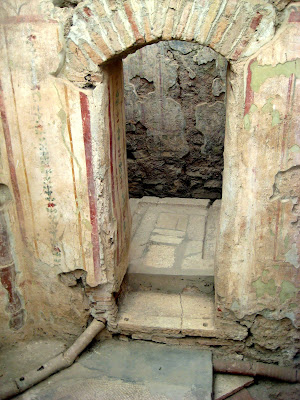September 9, 2010
Our tour of Ephesus began early in the morning with a drive up the hill above the ruined city of Ephesus, through the pine trees to the hidden Meryemana, The House of the Virgin Mary. This is the hideaway where St. Paul brought Mary to after Jesus died. It was a really amazing place to visit and I was taken by surprise at the deep response I had to being here.
Despite the parking lot full of tour buses, I found myself alone inside this house. With the soft music playing in the background and contemplating who had lived here, I was very moved. It boggled my mind to think that I was standing in the house of the woman who, in a way, was the origin of the Christian religion. She walked here, ate here, drew her water from a spring here, and died here. The sense of peace was powerful and I had a hard time tearing myself away from here.
I found it interesting that this is also a sacred site for Muslims who honor Mary as the mother of the Prophet Jesus and believe in the virgin birth.
These candles were located just outside the house. I lit one and said a prayer for my loved ones and for peace throughout the world. Every little bit helps!
After a quiet exploration of Mary's house, we headed to the main ruins at Ephesus. Ephesus is reportedly the best preserved classical city of the Eastern Mediterranean. The oldest settlements in the area are from the 5th to 3rd millennia BC. That is 3,000 to 5,000 years BEFORE Christ. Amazing. Most of what we saw was from the period called Ephesus III built around the 1st to 3rd centuries AD. This city had about 250,000 occupants.
This marble street was a main city boulevard, lined with statues and small shops and inns - including the requisite brothel.
Another shot of the same street. I thought the crowds actually helped me to get a sense of what it may have felt like when it was a busy commercial center.
The public toilet, built in the 1st century AD, was an amazing place. It is a very large room lined with toilets seats. There is a channel running below the seats that held running water. Our guide told us that rich merchants and politicians had slaves to sit on the marble toilet seats to pre-warm them as needed. Oh, sorry Thane, looks like you are a bit busy there...
The terrace houses, located off the main street, were the homes of the elite and wealthy. These homes were amazing with their frescoed walls and mosaic floors. They were generally two story homes with hot and cold running water and central heating! Each house also had it's own well in a central courtyard, for use when the city plumbing was not working. The light in these pics is a bit off as this whole area is covered by a protective roof.
Check out the pipe at the bottom of the doorway. These houses had piping for cold water, hot water, and heated air!
 |
| stone tile floor mosaic |
 |
| another stone tile floor mosaic |
The Celsus Library was one of the largest libraries of the ancient world, holding about 12-15,000 scrolls.
The theater is the largest structure at Ephesus. It was constructed in the 3rd century BC and could hold 25,000 people!
Leave it to Thane to notice this pile of clay pipes. They were stacked along side the path and looked like a pile of current construction materials. We asked, just in case, and amazingly found out that these are ORIGINAL pieces of plumbing from the city.
 |
| Ancient clay plumbing stacked in front of the Odeon |
 |
| Winged Nike, Goddess of Victory |
 |
| Another shot of the Celsius Library |
 |
| Temple of Hadrian |
 |
| Small detail from a fountain |
Is that all there is you ask? Why of course not silly! There is also this:
Sadly, this is about all that remains of this Ancient Wonder after earthquakes, fire, and looting by Goths.
OK - the following couple of pics may be considered X rated. If that is a problem - then please wave goodby until our next post ......
Up next was the Ephesus Museum in Selcuk. It was filled with lovely statuary, glassware and numerous artifacts. But of course, the most photographed is this little guy Priapus. He was found in a well outside the brothel. I bet you'd never guess that he is a fertility god!
This guy is Priapus' neighbor at the museum. Also a fertility god, note the large basket of fruit held up by his broken, but still erect body part.
Well, with those visions in your head, I bid you adieu until next time when we visit the little villages of Şirince and Tire.


























3 comments:
Fine coverage. I am so enjoying following your trip.
larry
What a great & momentous time you're having. Terrific photos...wish I was there. Enjoy!
Such impressive photos mate! It really made me feel as if I am there with your trip. I truly enjoyed reading your blog. Toilets Seats
Post a Comment